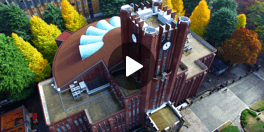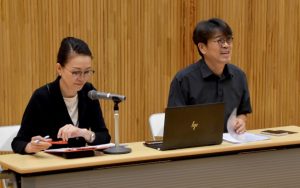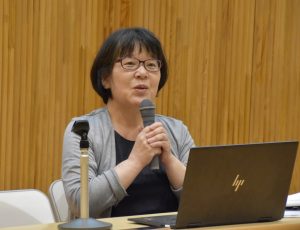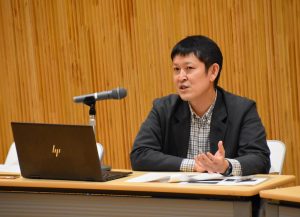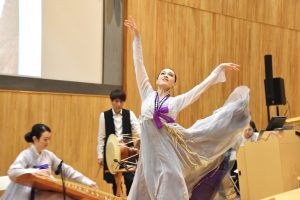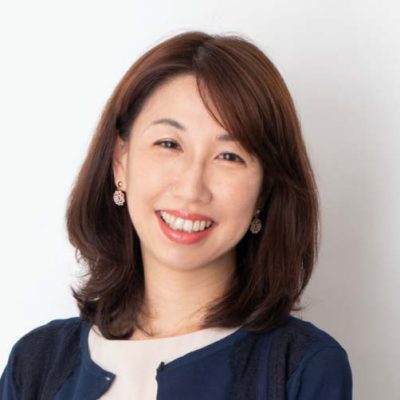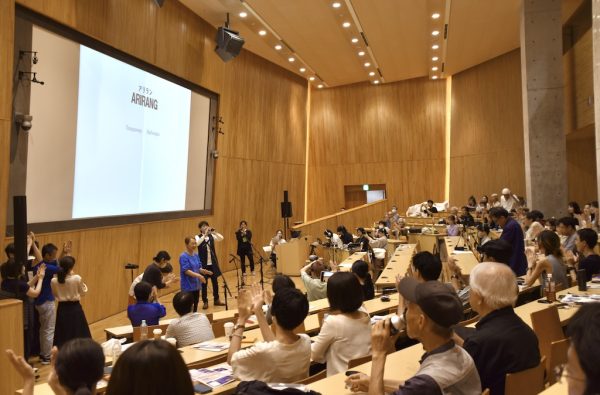
November 2, 2023
レポート:シンポジウム『レイシズムを記憶する意義 ー国際シンポジウムー 関東大震災虐殺ミュージアムを設立するために』Report: Symposium “Why We Need to Remember Racism”
2023年9月17日(日)、シンポジウム『レイシズムを記憶する意義 ー国際シンポジウムー 関東大震災虐殺ミュージアムを設立するために』が福武ホールにて開催されました。本シンポジウムは、主催者である一般社団法人東アジアピースアクションによる「1923関東朝鮮人大虐殺を記憶する行動」に加え、カルチュラル・スタディーズ学会研究企画委員会、田中東子研究室、ふぇみ・ゼミ&カフェの共催で企画されました。
田中東子教授は冒頭の挨拶で、今日のSNSの言論空間にあふれる誹謗中傷やステレオタイプ、ヘイトスピーチについて言及し、関東大震災でおきた虐殺の原因となったレイシズムや他者への偏見という視点は今もなお連続していると枠づけました。この虐殺は、100年前の過去の出来事ではなく、テクノロジーの発展した今日でもなお、私たちが批判的に考える必要のある問題であるということ、自然災害の折にマイノリティや女性たちなど社会的に弱い立場の人々がもっとも被害を被るということ、そうした問題を問い直すためにはダイバーシティ&インクルージョンの視座が必要であることなど、シンポジウムの主旨と絡めて述べました。
「1923関東朝鮮人大虐殺を記憶する行動」の活動報告に続いて、金鐘洙/김종수さん(韓国「記憶と平和のための1923歴史館」 館長)、国武雅子さん(特定非営利活動法人 岡まさはる記念長崎平和資料館 理事)、光岡寿郎さん(東京経済大学教授)の三名が講演を行いました。
金さんは歴史館の設立経緯や運営の様子を紹介し、民間の力で「国家暴力に隠された歴史の真実」を知らせるべく2020年末に開館したことを強調し、かつて反対を押し切って追悼碑を建てた人々の意志を受け継ぎながら、日本で関東のどこかに市民の力でミュージアムが設立されることを祈っていると述べました。次に国武さんは1995年に設立された、日本の侵略と戦争における加害責任を追求する資料館の館長の立場から、加害責任に焦点を絞った資料館が建てられたことの現代日本における意義や果たすべき役割などを話されました。続いて光岡さんは、ミュージアム研究者として、ミュージアムという社会制度が記憶の保存や認識の変化を促すためにどのように機能できるかという観点からの話題提供を行いました。金剛山歌劇団の関係者をはじめとするパフォーマンスも含めた本シンポジウムには、現地とオンラインあわせて約280名が参加しました。
記事・写真:山本恭輔(博士課程)
On Sunday, September 17, 2023, a symposium titled “The Significance of Remembering Racism – An International Symposium – For the Establishment of a Museum of the Great Kanto Earthquake Genocide” was held at Fukutake Hall. The event was organized by “Action to Remember the 1923 Kanto Korean Genocide” run by a general incorporated association “East Asia Peace Action,” with the cooperation of the Research Planning Committee of the Association for Cultural Typhoon, Toko Tanaka Laboratory, and Femi-Zemi & Cafe. In total, about 270 people participated in the event, both online and onsite.
The symposium opened with a performance of Changsaenap by Haa Yeongsu (Kumgangsan Opera Troupe), followed by a greeting from co-host Professor Toko Tanaka. Referring to the slander, stereotyping, and hate speech that abound in today’s online social media discourse space, Professor Tanaka framed the viewpoint of racism and prejudice against others that caused the genocide after the Great Kanto Earthquake as part of a continuum that still exists today. She also pointed out that the genocide is not merely a past event of 100 years ago, but a continuing issue about which we still need to think critically even today with the advancement of technology. Noting that minorities, women, and other socially vulnerable groups suffer the most when natural disasters occur, she emphasized the necessity of a perspective of diversity and inclusion in order to rethink such issues.
After the report on the activities of “Action to Remember the 1923 Kanto Korean Genocide,” lectures were given by Kim Jongsoo (Director of 1923 History Museum for Memory and Peace, Korea), Masako Kunitake (Oka Masaharu Memorial Nagasaki Peace Museum) and Toshiro Mitsuoka (Professor, Tokyo Keizai University).
First, Kim shared the story and the background of the establishment and operation of the museum of which he is the director, emphasizing that the museum was opened through the power of the private sector at the end of 2020 to inform people of “the truth of history hidden by state violence”. He expressed the hope that a museum will be established somewhere in Kanto Japan, by the power of citizens, inheriting the will of those who overcame opposition to build memorials. Next, Kunitake spoke from the perspective of the director of the museum established in 1995 to pursue Japan’s responsibility for aggression and war, highlighting why a museum focusing on responsibility for aggression was established and what role it should play in contemporary Japan. Mitsuoka then presented a talk from the perspective of a museum research specialist on how a museum as a social institution can function to preserve memory and promote changes in people’s perception. Finally, the five-hour long symposium closed with a performance by Haa Yeongsu, Gayageum player Kim Yonsil (Ex-Member of Kumgangsan Opera Troupe), and Korean dancer Song Yong Suk (Kumgangsan Opera Troupe).
Text/Photos: Kyosuke Yamamoto (PhD student)
主担当教員Associated Faculty Members
教授
田中 東子
- 文化・人間情報学コース
- 情報学環教育部
Professor
TANAKA, Toko
- Cultural and human information studies course
- Undergraduate research student program

